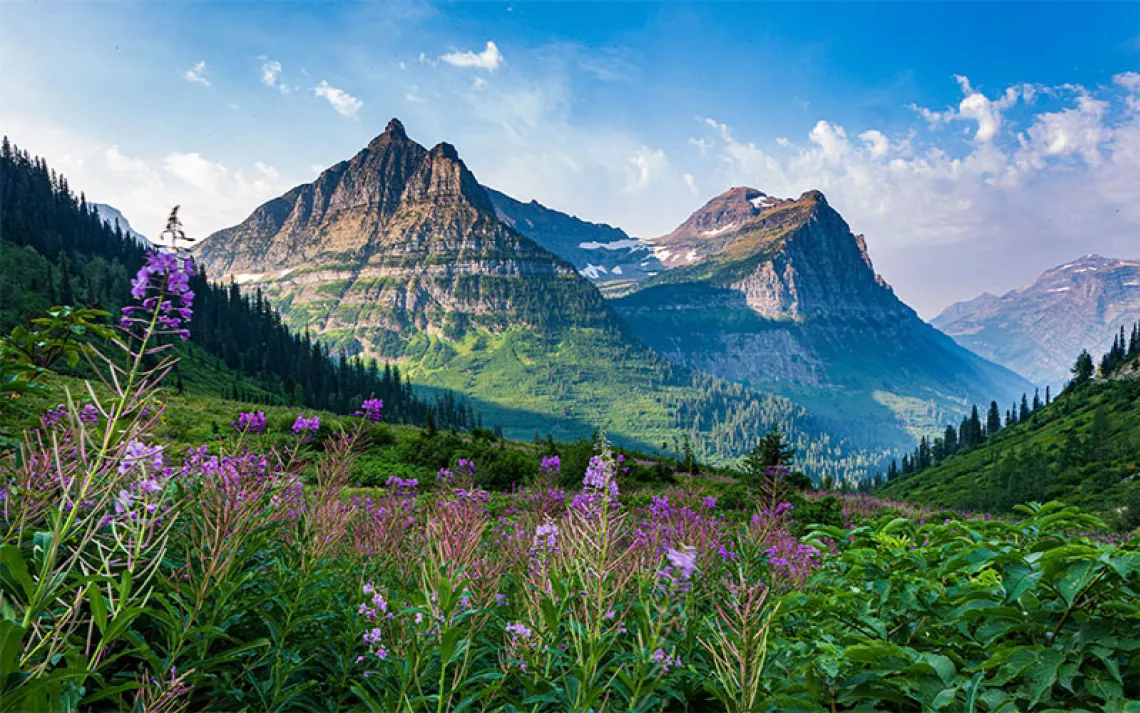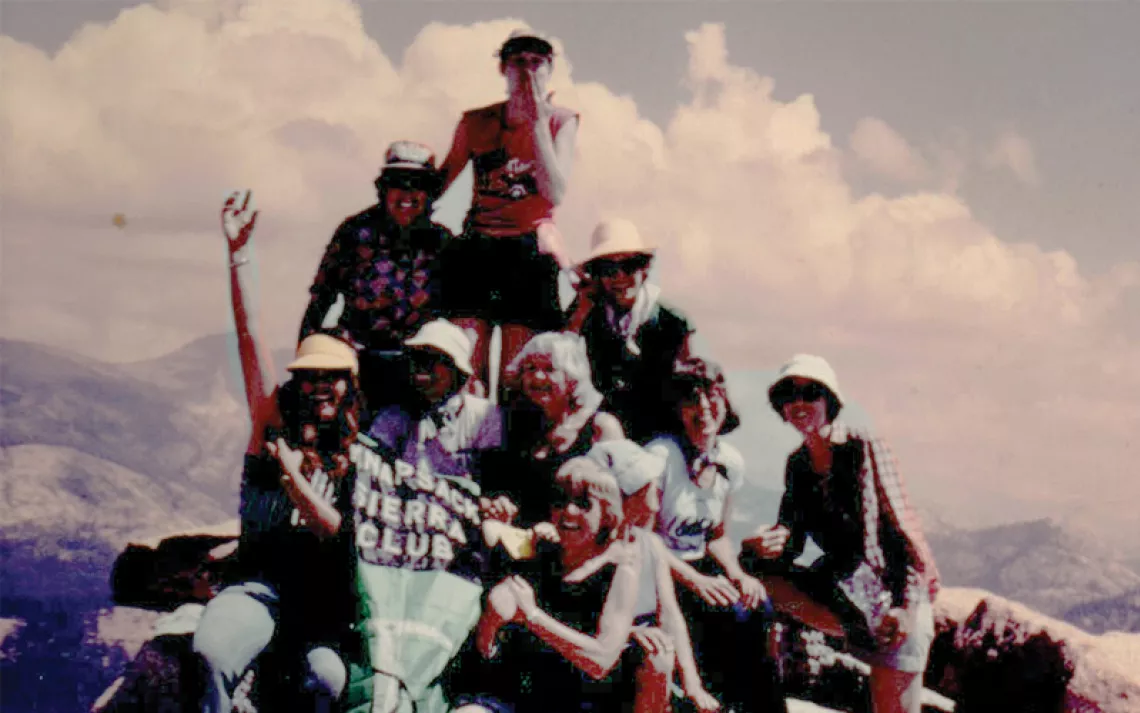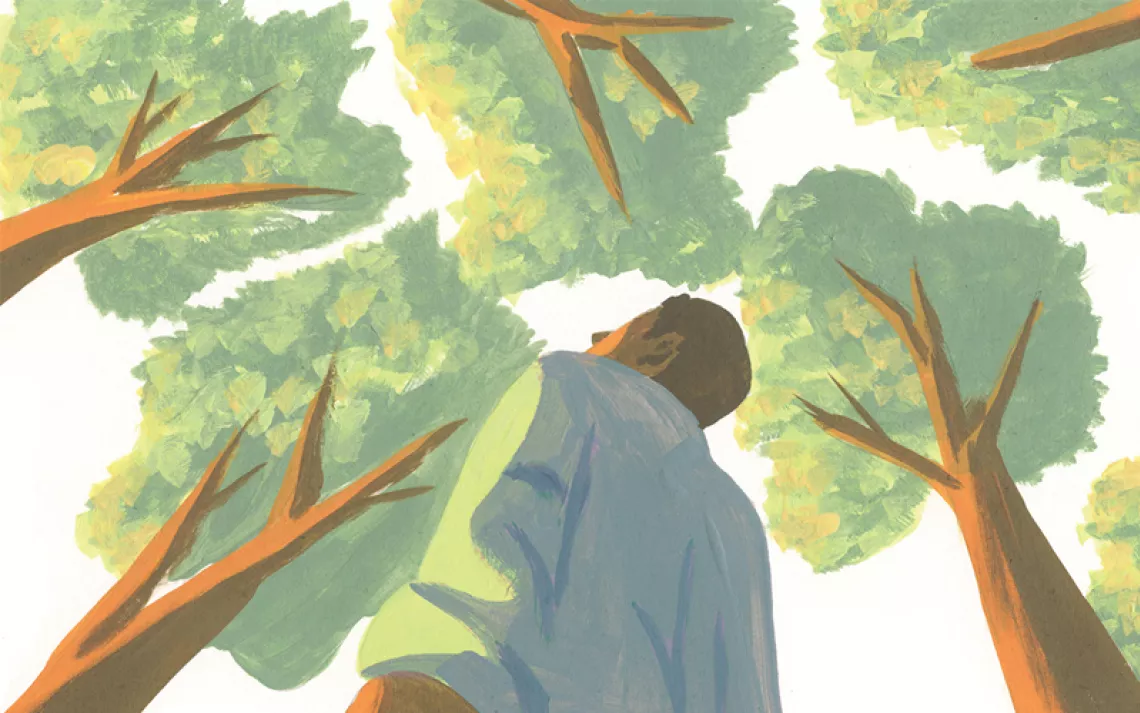My Big Backyard
Skiing the wild and wildly familiar on Vermont's 300-mile Catamount Trail

Vermont's 300-mile Catamount Trail. | Photo by Corey Hendrickson
WE WERE TRUDGING, NOT SKIING, when we happened upon Willy Graf. I couldn't be sure—and getting sure seemed rude if not outright perverse—but it looked as though he was peeing. His SUV was parked where our trail crossed a dirt road, and the driver's side door and back door were both open, with the space between the two forming a kind of privy. My expedition partner, Ross, and I had been transacting a considerable amount of "business" in the great outdoors ourselves, and I must admit that I felt some camaraderie with this old man right away. I dropped my pack, pulled out a four-pound bag of gorp, and said hello.
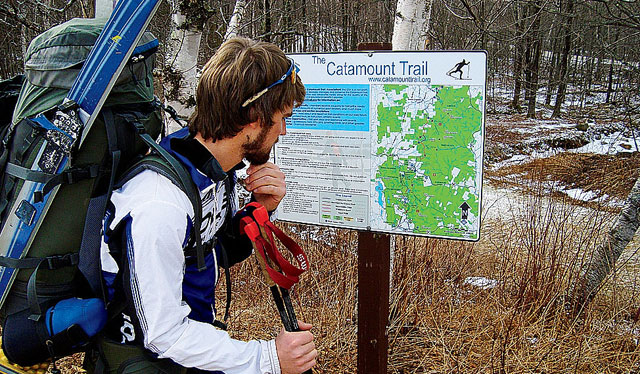
Expedition partner Ross contemplates a trailside map.
Noting that our skis were strapped to the outsides of our packs rather than shooshing along nicely beneath our feet, Willy said, "Pretty crummy winter for it, eh?"
He was right. All across Vermont, people were talking about it—one of the warmest winters on record. We told Willy that we were end-to-ending the Catamount Trail, that we'd started at the Massachusetts border nine days back, and that, yeah, earlier this morning our precious three inches of crusty base had finally, completely, crapped out. We'd tried skiing on some moss, and even on brown matted leaves, but opted instead for a painful, steady forward trudge. Our goal, the Canadian border, was still 180 miles away.
Willy commiserated. "I snowshoed 103 days out here last year," he said. "This year, maybe 6." As he spoke, he leaned over to strap to his boot a lightweight crampon, the kind dog walkers use on icy sidewalks. His movements were shaky. I was tempted to offer a hand, maybe stabilize him, but then it hit me: 103 days. He looked up at us and said, "I probably know every rock and root in the whole place."
It turned out that Willy was 89 years old. He told us about his youth in Switzerland, tromping and tramping. He told us about the importance of choosing to spend time outdoors, and with family, over spending time in the office making money. He told us about bushwhacking, about falling on a frozen pond last year, breaking a handful of ribs, and dragging himself back to this very trailhead so he could drive to the emergency room. Ross, whom I've known since preschool and who reminds me of a small moose—strong, quiet, completely at home in the woods—was impressed. I could tell because the rate at which he was sucking down gorp slowed the tiniest bit.
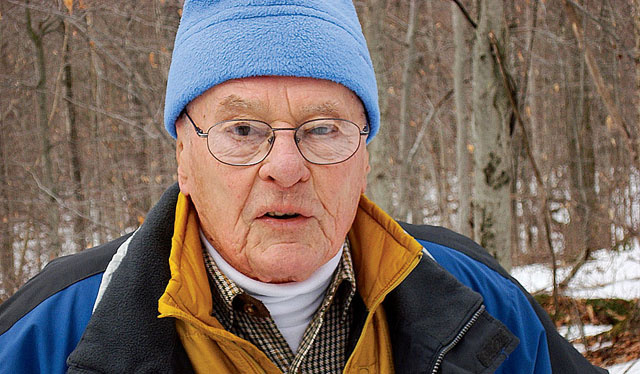
Snowshoer Willy Graf, 89.
It would have been easy to sit and listen to Willy for hours, but Willy hadn't become Willy by standing around yapping all day. With some difficulty, he secured his other crampon, then stepped down onto a frozen gully paralleling the road. At the far side of the gully, a steep, eroding bank led up to the trail. We said goodbye, and he crossed the ice and bashed his way up the incline, kicking in steps like a mountaineer. There was no shakiness in him now.
At the top, he stopped and turned. "Hals- und Beinbruch," he said, and for an instant my heart sank. Gibberish. What a shame. Maybe he wasn't the strong, sharp, fierce outdoorsman that Ross and I so badly wanted him to be. Maybe he was just a kooky old babbler with a pee-anywhere-anytime philosophy.
But he went on. "It's German. It means 'Break your neck and your leg.' We used to say it as kids skiing in the Alps."
I repeated the phrase back to him, across the gulch, and he corrected my pronunciation. "It's something like 'Give 'em hell,'" he said. "And that's what you boys are doing. So keep it up. Hals- und Beinbruch! Give 'em hell!"
SKIING THE LENGTH OF VERMONT, a state often associated with leaf peeping and maple syrup slurping, was a far cry from my previous icy adventure—skiing on the East Antarctic Plateau, the planet's driest, coldest, windiest, emptiest, deadest icescape. While working at the Amundsen-Scott South Pole Station a few years ago, I frequently skied alone, for fun, out into the screaming silence of that most extreme and inhuman wilderness. I squinted against the midnight brightness, searching in vain for the line between snow and sky, for anything to anchor my gaze. But there was nothing to see, literally no thing: no tree, no pebble, no person. I most assuredly didn't see an 89-year-old man peeing beside his SUV.
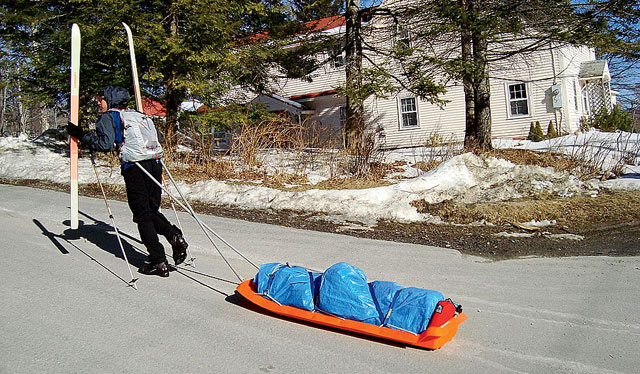
The author hauls gear on warm pavement.
A 20-day trip on the 300-mile Catamount Trail, the longest cross-country ski trail in the country, is not freakishly extreme. For one, there are no catamounts. It is not endlessly white or dangerously inhospitable. Don't get me wrong—the trail does provide a "traditional" adventure with requisite doses of hardship, monotony, and risk (read: wet sleeping bags, endless climbs, sketchy descents). It also offers access to countless hollows, outcrops, beaver ponds, and frozen cascades, each remote in spirit if not in miles. The trail is long. It goes up and down. It goes and goes. It is rural, rugged, elemental. And the winter storms, when they come, can be severe. That said, there's no denying that Vermont's wilderness is more of a whisper than a wild, screaming silence. It's the whisper of snow sliding from a hemlock bough, wind easing over a raven's wing, Gore-Tex brushing Gore-Tex.
The Catamount Trail traverses private woodlands, Nordic touring centers, national forests, golf courses, hiking paths, farm fields, frozen reservoirs, snowmobile corridors, unplowed roads, and many other skiable terrains. Rather than submerge yourself for weeks in the wild, you trudge and shoosh for a day or two, then pop into a general store for doughnuts. If you're lucky, you stumble into a conversation with some trailside octogenarian. Part old-school suffer-fest, part soul-stirring nature pilgrimage, part swank dinner party—that's the Catamount Trail. Or, as I prefer to call it, Adventure in My Big Backyard.
Chicken breasts with diced blood orange, fried green bananas, black beans, corn bread, saffron rice. It was a dinner party all right, not exactly in our honor, but close enough. Grandpa arrived with a bottle of red wine. Candlelight flickered. The toddler was put to bed. I ate thirds of everything, and Ross did the same. Wary tentmate that he is, he gave me a sidelong glance when I reached for fourths on the black beans. I shot the glance right back at him. An opportunity had presented itself, and there was only one thing to do: Hals- und Beinbruch! Give it hell!
For more than a week we'd been waking in the dark, hitting the trail by dawn, skiing 12 hours, wolfing down sticks of butter in a relentless quest for calories. The snow, when we'd found it, had been the definition of old crud: rough, frozen, nearly without traction. Moose-strong Ross had hardly looked fatigued, but I'd felt masticated, as if Old Man Winter had chewed me up and dribbled me out onto his big icy bib. A blister on my heel had eaten through a third layer of skin and was hungering for a fourth. My long johns were rotten. A break sounded pretty good.
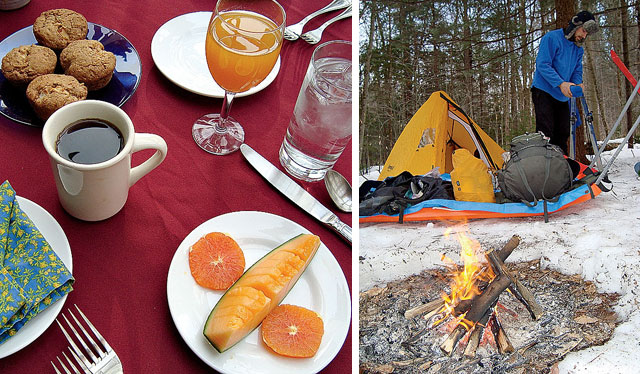
Left: A breakfast spread at the Blueberry Hill Inn. Right: Breaking camp beside a morning fire.
And then it happened—suddenly, unexpectedly, randomly—in perfect Catamount Trail style. We were near the end of an arduous 16-mile day that had taken us through spruce-fir highlands, down a vertiginously steep skidder road, over bobcat and grouse tracks, alongside a creek, behind a condo, past a parking lot, into a thicket, out of a thicket, and into the cold, clear evening. The sun was down, the sky glowing purple-orange above inky ridges. We were in a boggy area and had been for a while, heads lowered, skiing to the drumbeat of our hardworking hearts. And then we were in a yard, a howling dog escorting us over to the back door of a large house. A woman poked her head out and invited us inside.
Our outdated guidebook said this was a B&B, but the renters, two restaurateurs from Manhattan, said the business had closed five years ago. No matter. Their names were Lindsey and Jack. Lindsey introduced her father, Grandpa, a white-haired man in a sweater. Tonight, she said, was Cuban Night.
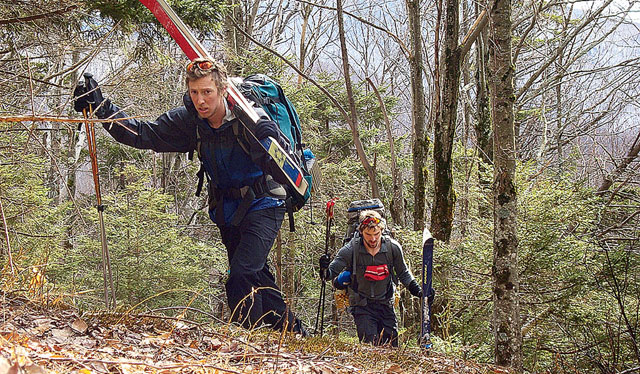
Trudging in central Vermont's snowless Green Mountains.
So we ate and ate and did the dishes and dried our socks by the woodstove and listened to Grandpa's stories of ski-touring these hills with homemade gear 60 years ago. Our tent was waiting in the backyard, and I was about ready to seek out its privacy, what with the beans and all, when Jack mentioned coffee.
"No, I'd be up all night," I said.
"I meant in the morning," Jack said. "I get up around six and can have some going by a quarter after."
I took a moment to consult with my inner adventurer, that stodgy traditionalist built of pemmican, hardtack, tobacco, and nails. Buzzed, stuffed, and half asleep, he made no response. I told Jack that coffee would be great.
"And do you like blueberry pancakes?" Jack said.
"Yes," I said. "With butter."
BREAK YOUR NECK AND YOUR LEG! The next day my binding came apart and we hitched a ride with a local metalworker whose brother had skied down Mt. Everest. The metalworker took us into a little resort town, where his father, for $3, repaired the binding, lectured for an hour on the corporatization of the ski industry, and shuttled us back to the trail in his minivan. We hopped out into subzero temperatures, built a bonfire hot enough to sit beside barefoot, and drank a tea of boiled pine needles late into the night. Right after we set out at dawn, we got lost, skiing imperfect circles through a maze of snowmobile trails. Come evening we were lost again, skiing other odd shapes beneath a maze of stars.
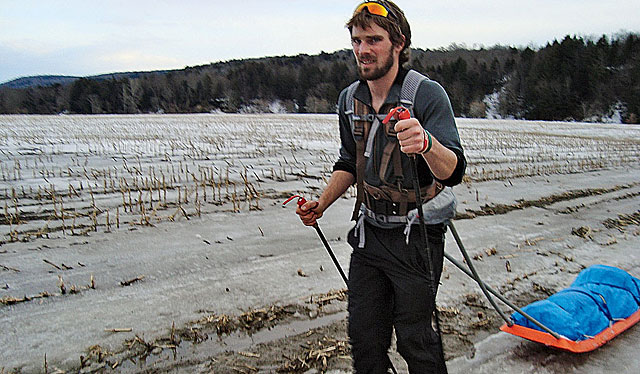
Ross skis sloppy cornfields.
With time, Ross and I came to understand that the trail's greatest attribute was its relentless unpredictability. We trudged to the Blueberry Hill Inn, where the owner offered us a free night's stay, cheese board and wood-fired sauna included. A ponytailed guy doing chores at the inn knew of some snow; he led us to it and skied at our side. Ross's brother also skied at our side, as did the vice president of the Trapp Family Lodge, who's the grandson of The Sound of Music's Maria von Trapp. A friend bearing whiskey was waiting patiently for us, like a frosty little gnome, on the side of a tall mountain.
Scenes appeared: rabbit hunters on train tracks, bald eagles on snags, tumbled stone walls below rime-coated cliffs. Beer cans littered train tracks. Bear claws marked black cherry trees. Sometimes the forest was so dark or the campsite so remote that I swore we were no longer in Vermont. But then the next day we'd make quesadillas in a gas station microwave. We skied over and under and past and through it all, the wild and the wildly familiar.
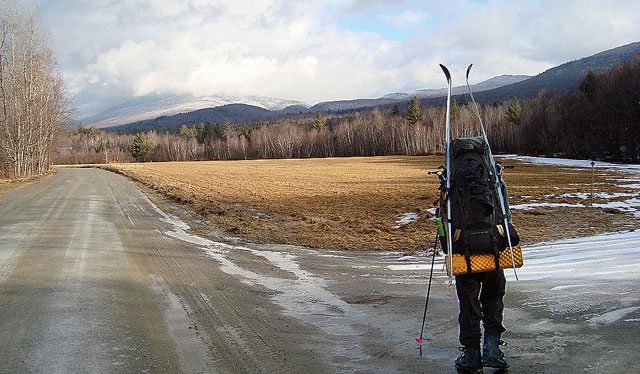
Mt. Abraham looms in the distance, promising better conditions.
As we headed toward the summit of Jay Pass, the last significant obstacle standing between our ski tips and Canada, the biggest, maddest snowstorm of the winter grew bigger and madder. It was the final day of our expedition. If weeks earlier I'd felt chewed up, skiing crud-snow or nothing at all, now I was down in Old Man Winter's gut, suffering the destructive forces of digestion: blowing ice crystals, shrieking trees, drifting walls of powder. Lactic acid climbed up through my legs and into my brain. I stopped, pulled my glove off, and felt around with my bare hand. My nose was gone, or maybe my fingers were numb. I couldn't tell and hardly cared.
Ross stood beside me, hunched over his poles. He wore a black balaclava that made him look like a scuba diving moose. His beard held ice. His cheeks were growing delicate feathers of frost, and the feathers were growing feathers, and underneath it all he was smiling. But it wasn't a pretty smile. It was the smile of a miserable, desperate, borderline-hypothermic man who enjoys nothing more than misery and desperation. It filled me with pride to see Ross looking so exhausted, as if the exhaustion itself were a tribute to the immensity and diversity of the landscape. I hadn't looked in a mirror in some time, but I figured that looking at Ross was probably close enough.
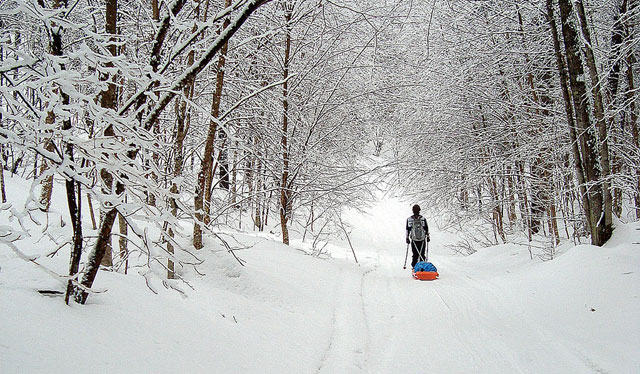
Deep woods and fresh snow in the state's northern reaches.
For five hours we'd been breaking trail through shin-deep, knee-deep, and thigh-deep snow. For three weeks we'd been fantasizing about and hoping for this very thing: a mega-storm to pave our path with snow and ice. Now that it was here, we found it both exhilarating and debilitating. Ross had doughnuts in his backpack, and I wanted to eat them. I wanted to ski uphill with the force of sugar as if I were skiing downhill with the force of gravity. But we knew it would be a mistake to stop to get them out. We needed to keep skiing, slowly, painfully, up into the churning vortex of the storm.
So that's what we did. We spread out along the trail, each of us settling into his own rhythm, descending into his own inner realm. Mine is usually a calm, quiet chamber, a refuge without wind or cold where a voice says, Keep going, keep going. But in that hour of need, I couldn't hear the reassuring voice. I heard only wind, and it wasn't whispering. And then inside that wind, I did hear a voice. It was a small voice growing louder. "Hals- und Beinbruch," it was saying. And then it was yelling: "Give 'em hell!"
What was that? A hallucination? A memory? Some kindly old spirit skiing at my side?
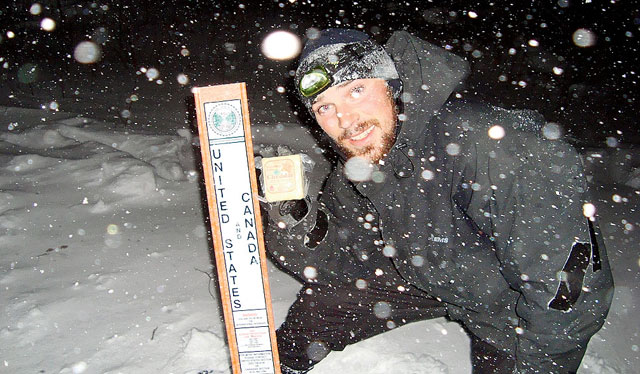
Ross celebrates at the Canadian border in the heart of the season's fiercest storm.
In Antarctica I'd met a trekker whose eye had frozen shut. Now my eyes were freezing shut. Maybe they'd been shut for a long time. I was confused. I forced them open and there was the top of Jay Pass, not the South Pole, but a road winding over a mountain ridge. Cars were parked along one side of the road. Bearded dudes were drinking beer, tailgating, hiking up their ski socks. French-Canadian snowboard chicks in pink helmets were smoking cigarettes, preparing for a backcountry run. A pickup truck cruised by at an unsafe speed. Old Man Winter belched. I was confused. Where was Ross? Where were the blueberry pancakes? What kind of adventure was this?
Three hundred miles. The length of Vermont. The length of my big backyard.
A gust of wind knocked me sideways, but I did not fall. Hals- und Beinbruch, I thought, and kept going, onward to doughnuts and the end of the trail.
 The Magazine of The Sierra Club
The Magazine of The Sierra Club
